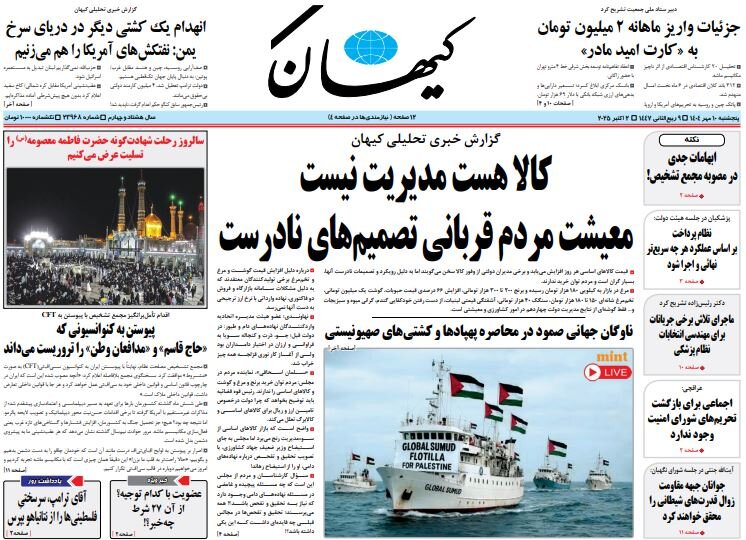Tehran must act in line with its national interests

TEHRAN - In a note, Kayhan discussed the activation of the snapback mechanism by the European trio (Britain, France and Germany) and Iran’s nuclear program, writing: Snapback does not limit Iran’s nuclear program; rather, it accelerates the collapse of oversight.
Snapback does not limit Iran’s nuclear program; it accelerates the collapse of oversight. Rather than building on the recent Iran-IAEA framework that could restore some transparency, snapback undermines it. By closing the door to diplomacy, it also ensures that Iran’s nuclear program will only become more secretive and more fragmented. Russia and China have rejected the move by the three European countries outright, saying that a party that violates a treaty cannot legally invoke its provisions. The two veto-wielding powers in the Security Council have announced that they will not implement snapback. This means that not only will they refuse to comply with sanctions, but even Security Council committees will likely be suspended. Perhaps most importantly, many Iranians are coming to a bitter conclusion: Whether Iran remains in the NPT or not, whether it cooperates with inspectors or not, the United States and Israel may strike again. The lesson for Iran is that international rules and institutions no longer matter, so Tehran must act according to its own national interests.
Iran: The way out of the crisis
In an interview with the Iran newspaper, Dr. Seyyed Jalal Dehghani Firouzabadi, a professor of international relations, discussed how to navigate the post-snapback crisis. He said: Ways out of the crisis require a multifaceted, cautious, and gradual strategy; radical, emotional solutions increase the risk of escalating the conflict. Therefore, the necessary steps include implementing “smart coercive diplomacy” and focusing on “preventing the escalation of the crisis” in the critical months ahead. At the same time, maximum exploitation of relations with Russia, China, and other non-Western partners to neutralize sanctions and alternative economic projects by strengthening economic diplomacy. Along with these, increasing domestic resilience and military deterrence, especially air defense, should be given priority to increase the cost of any military option against Iran. If these measures are implemented simultaneously and in a coordinated manner, the chances of overcoming the current crisis can be increased, and threats can be transformed into diplomatic and economic opportunities.
Shargh: Impact of CFT on Iran’s diplomatic strategy
In a commentary, Shargh discussed the consent of the members of the Expediency Council with Iran joining the CFT and wrote: Experts believe that implementing FATF standards can facilitate Iran's access to the global banking system and restore banking relations, an issue that is vital for oil and non-oil exports, attracting foreign investment, and even financing domestic projects. But the dimensions of this decision are not only economic. On the political level, agreeing to the CFT can be a positive signal to the international community, especially to European countries that invite Iran to adhere to global standards. In a situation where snapback sanctions against Iran have been activated and the atmosphere in foreign relations is tense, such a decision shows that Tehran is still ready to engage constructively with the international system in line with its interests. This message is especially important for countries that still have openings for economic interaction with Iran. The approval of the Expediency Council can pave the way for new talks and limited banking and financial agreements with some regional and European partners.
Donya-e-Eqtesad: Creating opportunities or killing opportunities?
The activation of the snapback mechanism and the return of secondary sanctions against Iran will quickly spread to the economy and the daily lives of Iranians. In this context, banks and financial institutions in various countries, from the Emirates and Oman to Turkey and Europe, have been required to examine the origin of Iranian assets and financial transactions more carefully. This situation creates a serious dilemma for many Iranian economic actors: accepting the risk of blocking resources and assets or transferring capital into the country. This trend could be the beginning of a new wave of reverse financial migration on a billion-dollar scale. The return of Iranian capital to the country is a reality that will happen sooner or later, and this trend is simultaneously the greatest opportunity and the most serious threat to the Iranian economy. If the economic governance system is not reformed, this wave could lead to unbridled inflation, favoritism, and a greater social divide. But if reforms are carried out, the return of capital will become a springboard for infrastructure development and bring Iran’s economy closer to global standards. The country now faces a fateful choice: creating opportunities or burning opportunities?
